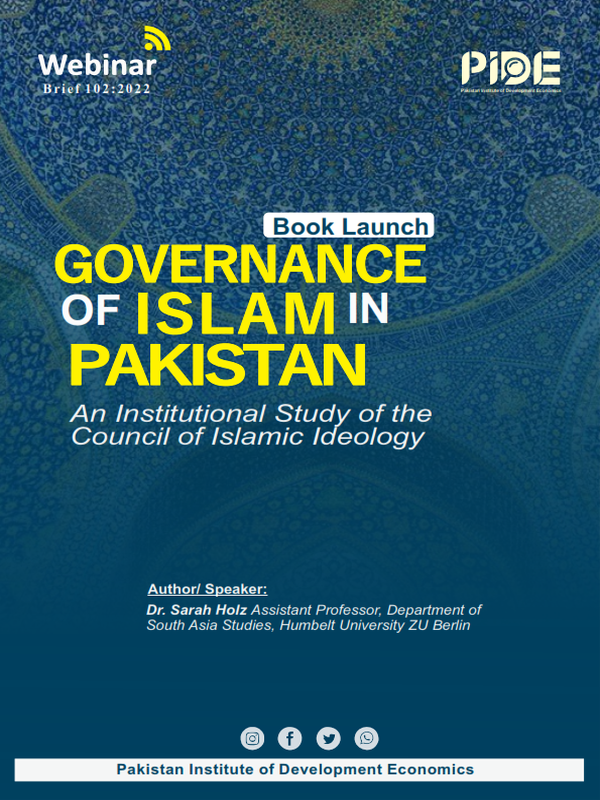Governance Of Islam In Pakistan: An Institutional Study Of The Council Of Islamic Ideology
The launch of the book “Governance of Islam in Pakistan: An Institutional Study of the Council of Islamic Ideology” by Dr. Sarah Holz was held at PIDE in a hybrid seminar. Mr. Fida Muhammad Khan, Lecturer at PIDE School of Social Sciences (PSSS), moderated the seminar. Dr. Holz presented key points the book with Mr. Suresh, Ms. Salma Rahim, and Mr. Abdul Rehman, each expressing their thoughts on the chapters of the book they had reviewed.
Key Takeaways from the book:
- The book tries to provide an understanding of the role and function of the Council of Islamic Ideology in Pakistan and a broader understanding of the state’s religious institutions.
- Religious Institutions of the state are often overlooked and labeled as rubber-stamps, ineffective, and auxiliary by political scientists. While scholars from the fields like Islamic studies mostly scrutinize theology alone, not the institutions, and even when these institutions are studied, they are looked at in isolation. This book looks into the network of these institutions and maps them out.
- The book discusses the historical debates about the need for Islamic institutions in the constituent assembly and outside of it.
- It also looks into the council’s composition over time, its constitutionally prescribed task, and how it is practiced and compares the two.
Main Arguments:
- The author uses the term ‘governance’ instead of Islamization and bureaucratization and argues should be used because religion is a very integral part of everyday life in Pakistan, and governance allows us to study other factors too for any historical development such as patriarch, ethnicity, and language, not just religious/Islam.
- The governance lens also allows looking at things as an open-ended process instead of a simple question of failure or success, as the processes in governance are usually negotiated. It is necessary to look at all stakeholders instead of blaming certain people for certain things, for example, the role of ministries in referring to minute questions and the role of the Prime Minister and the President in appointing members of the Council.
- The institutions governing in reference to Islam, i.e., the Council of Islamic Ideology, the Federal Shariah Court, and the Islamic Research Institute form a network:
- If an issue is discussed in one institution, it is also done in others to amplify and keep the pressure.
- The same principle applies when it comes to silence, the issues that are not to be discussed are never discussed at any of the institutions.
- The Network helps to keep issues alive; when a discussion on an issue in one institution winds up, the other institution picks it up.
- They frame the discussion and its limitations on it.
- The Council reflects the current patterns of rule and governance in the country. It doesn’t operate alone in an isolated religious sphere, and it is rather embedded in the pattern of rules, i.e., feudalism, classism, authoritarianism, colonialism, capitalism, and so on.
- By studying the Council, analyzing the council members, and as well as issues that the council takes up, we can see how the governance pattern and rule pattern change over time.
- In the 1960s, the Council members were drawn from a very small elite pool very often called Khandani or Sharifs; in 1970, during the PPP’s reign when there was an emphasis on representations after losing half of the members of the Council as they were from the East Pakistan membership was extended to elites beyond Karachi and Lahore.
- Informality and vagueness: the members are appointed without a clear set of criteria by the president, and the chairman of the Council has far-reaching powers depicting the informality, vagueness, and centralized power structure, which are also features of Pakistan in general.
Reviews/Comments:
- Reading through the first chapter of the book, which is about the historical traces of the Council, Mr. Saruesh thinks that since Punjab provincial government was the founder of the institution that later became the Council of Islamic Ideology, therefore Punjab is not only the nucleus of Pakistan from an ‘establishment’ or ‘military’ point of view but from the ideological perspective.
- Ms. Salma Rahim, who reviewed the chapter on the Network of State Institutions, added that though one of the objectives of these institutions is to bridge the gap between traditional (madrassa) and modern (university) education, they are doing almost nothing in practice to achieve this goal and are instead busy creating gray areas for the incumbent governments/ authorities to be used for their political interest.
- Mr. Abdul Rehman, while commenting on the practice of the Council, said that the council has ignored major issues like elite capture, governance, and structural inequality but has consumed all its time on minor social issues.
The Council of Islamic Ideology though not been as successful as it is expected in performing its functions and
has been used as a political tool far too many times but has some achievements under its belt including
rejecting the Hasba Bill passed by the MMA government in Khyber Pakhtunkhwa in order to implement
Sharia law in the province and its contribution to the ratification of the Hudood laws where the victims were
previously considered as part of the crime.




